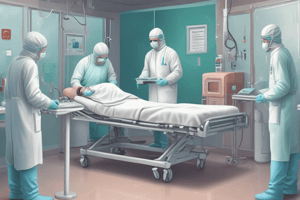Podcast
Questions and Answers
What is the primary focus of infection prevention?
What is the primary focus of infection prevention?
- Reducing the risk of transmission of microorganisms to healthcare providers, patients, and visitors (correct)
- Treating nosocomial infections
- Developing new antibiotics
- Improving patient outcomes
What does Ro represent in the context of infection prevention?
What does Ro represent in the context of infection prevention?
- The reproduction rate of microorganisms
- The transmission rate of a disease
- The number of cases one case generates over the course of its infectious period (correct)
- The number of people infected by a single individual
What is the goal of infection prevention in terms of patient outcomes?
What is the goal of infection prevention in terms of patient outcomes?
- To increase antibiotic usage
- To improve patient satisfaction
- To reduce the spread of infections, resulting in improved survival rates and reduced morbidity (correct)
- To reduce the length of hospital stay
What is the 'Practice' aspect of the 4 P's of infection prevention and control focused on?
What is the 'Practice' aspect of the 4 P's of infection prevention and control focused on?
What is the purpose of antimicrobial prophylaxis in infection prevention?
What is the purpose of antimicrobial prophylaxis in infection prevention?
What is the 'Place' aspect of the 4 P's of infection prevention and control focused on?
What is the 'Place' aspect of the 4 P's of infection prevention and control focused on?
What is the primary purpose of personal protective equipment (PPE) in infection prevention?
What is the primary purpose of personal protective equipment (PPE) in infection prevention?
What is the role of distancing, separation, and restriction of movement and of visitors in infection prevention?
What is the role of distancing, separation, and restriction of movement and of visitors in infection prevention?
What is the purpose of decontamination and sterilisation in infection prevention?
What is the purpose of decontamination and sterilisation in infection prevention?
What is the focus of infection prevention in relation to patients?
What is the focus of infection prevention in relation to patients?
What is the primary purpose of using Personal Protective Equipment (PPE) in healthcare settings?
What is the primary purpose of using Personal Protective Equipment (PPE) in healthcare settings?
Who may use Personal Protective Equipment (PPE) in addition to healthcare workers?
Who may use Personal Protective Equipment (PPE) in addition to healthcare workers?
What should the choice of Personal Protective Equipment (PPE) be based on?
What should the choice of Personal Protective Equipment (PPE) be based on?
What can happen if Personal Protective Equipment (PPE) is used inappropriately?
What can happen if Personal Protective Equipment (PPE) is used inappropriately?
What is an example of a physical barrier used to prevent patient-to-patient transmission of infection?
What is an example of a physical barrier used to prevent patient-to-patient transmission of infection?
What is an essential aspect of good practice for healthcare workers?
What is an essential aspect of good practice for healthcare workers?
What is a characteristic of a healthy healthcare worker?
What is a characteristic of a healthy healthcare worker?
Why is it essential for visitors to be fully inducted in the use of Personal Protective Equipment (PPE)?
Why is it essential for visitors to be fully inducted in the use of Personal Protective Equipment (PPE)?
Flashcards are hidden until you start studying
Study Notes
Infection Prevention
- Infection prevention is the discipline concerned with preventing nosocomial or healthcare-associated infections, focusing on evidence-based practices and procedures to reduce the risk of transmission of microorganisms to healthcare providers, patients, and visitors.
Sources of Infection
- No specific information provided in the text.
Route of Transmission
- No specific information provided in the text.
Basic Reproduction Number (Ro)
- Ro is the average number of cases one case generates over the course of its infectious period in an otherwise uninfected, non-immune population.
- If Ro > 1, there will be an increase in cases.
- If Ro = 1, the number of cases will remain stable.
- If Ro < 1, there will be a decrease in cases.
Factors Determining Transmissibility
- Infectious dose is the number of microorganisms needed to cause infection, which varies by microorganism and immunity of the potential host.
Preventing Infections in Healthcare
- Key principles include:
- Distancing/separation/restriction of movement and of visitors
- Personal Protective Equipment (PPE): gloves, gowns, masks, eye protection
- Hand hygiene
- Cleaning, disinfection, and sterilization
- Waste management
- Staff health management: exposure prophylaxis, health monitoring (occupational health)
- Discharge of patients
- Care of the deceased
Goals of Infection Prevention
- Prevent the spread of infections from:
- Patient-to-patient
- Patients to healthcare providers
- Healthcare providers to patients
- Healthcare providers to healthcare providers and to visitors and others in the healthcare environment
- Consequently, this will:
- Protect patients from HAIs, resulting in:
- Improved survival rates
- Reduced morbidity associated with infections
- Shorter length of hospital stay
- A quicker return to good health
- Protect patients from HAIs, resulting in:
The 4 P's of Infection Prevention and Control
- Patient: improved health/immunity
- Pathogens (and/or vector): reduction or eradication
- Practice: behavioural change; protective equipment
- Place: environment
Infection Control Considerations
- Patient:
- Improved health/immunity
- Specific measures: MRSA screens, disinfectant body wash
- Pathogens (and/or vector):
- Reduce/eradicate pathogen: antibacterials, disinfectants, decontamination, sterilization
- Reduce/eradicate vector: eliminate vector breeding sites
- Practice:
- Infection control at all levels: awareness, policies, training, leadership, engagement
- Place:
- Ensuring all premises delivering healthcare are infection control compliant
- Building, wards, consulting rooms, communal areas, toilets, furnishing, flooring, air conditioning/heating system
Personal Protective Equipment (PPE)
- PPE is a barrier between healthcare workers and an infectious agent from the patient, reducing the risk of transmitting micro-organisms from healthcare workers to patient(s) or vice versa.
- Examples of PPE: gloves, aprons, long sleeved gowns, surgical masks, eye goggles, face visors, and respirator masks.
- PPE may be used by patients' family/visitors in certain situations.
Prevention of Transmission of Microorganisms
- No specific information provided in the text.
Inoculation Accidents
- No specific information provided in the text.
Handwashing Technique
- No specific information provided in the text.
Preventing Patient to Patient Transmission of Infection
- Halting patient to patient transmission:
- Physical barriers
- Isolation of infected patients
- Protection of susceptible patients
Studying That Suits You
Use AI to generate personalized quizzes and flashcards to suit your learning preferences.




